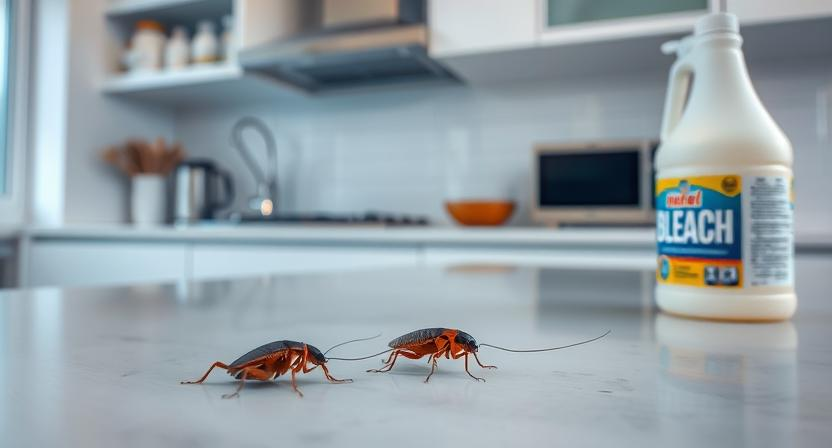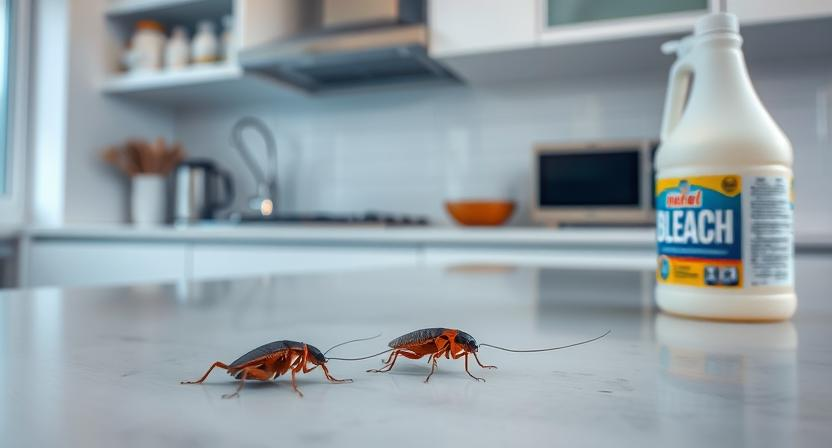Cockroaches are among the most persistent pests in homes, capable of surviving in various environments. These resilient creatures have earned their reputation for being difficult to eliminate, making many people resort to various methods to get rid of them. One common household item often thought to help in pest control is bleach. But does bleach kill cockroaches? Let’s explore this idea to see if it’s a viable solution for your cockroach problem.
Understanding Bleach as a Household Cleaner
Bleach, specifically sodium hypochlorite, is a powerful disinfectant commonly used in cleaning and sanitizing. It’s effective at killing bacteria, viruses, and fungi, which is why it’s so popular in homes and hospitals. However, its effect on pests like cockroaches is a bit different from its role in disinfecting surfaces.

How Bleach Affects Cockroaches
While bleach can be harmful to cockroaches, it doesn’t work in the way most people expect. Here’s what we know about bleach and cockroaches:
- Bleach as a Contact Killer: If a cockroach comes into direct contact with bleach, it can be harmful. The bleach may cause damage to the insect’s outer shell (exoskeleton), which helps protect its internal organs. This could lead to dehydration, ultimately causing the cockroach to die, but it is not a guaranteed outcome. Cockroaches are known to be resilient and might not always perish instantly from bleach exposure.
- Bleach’s Lack of Attraction: Unlike other chemicals or traps that attract cockroaches, bleach doesn’t have a strong odor or effect that draws them in. If cockroaches aren’t coming into contact with the bleach, it won’t do much to deter or eliminate them.
- Difficulties with Efficiency: Even if you spray bleach directly on a cockroach, it may not be the most effective or efficient method for eradication. Cockroaches are known to move quickly and can escape a bleach trap before the solution has time to fully take effect. Additionally, since bleach is a corrosive substance, it can create health hazards when used in large quantities around living areas.
Are There Better Alternatives to Bleach?
If you’re trying to get rid of cockroaches, there are several alternatives that might be more effective than bleach. Here are a few options:
- Cockroach Baits and Traps: Specialized baits and traps are specifically designed to attract and kill cockroaches. They contain poison that cockroaches carry back to their nests, helping to eliminate not only the visible pests but also those hidden in the walls.
- Insecticidal Sprays: There are various commercial insecticides designed to target cockroaches, providing quicker results than bleach. Many contain insecticides like pyrethroids, which affect the nervous system of insects.
- Diatomaceous Earth: This natural, non-toxic powder is effective at killing cockroaches by dehydrating them. When they walk across it, the tiny particles penetrate their exoskeleton, causing them to dry out and die.
- Essential Oils: Certain essential oils, such as peppermint or tea tree oil, are known to repel cockroaches. These oils can be mixed with water and sprayed around the home as a natural deterrent.
- Prevention: Preventing a cockroach infestation in the first place is the most effective solution. This involves keeping your home clean, sealing cracks and crevices, and storing food properly.
How Pests Affect Your Health and What You Can Do About It
Conclusion
While bleach may cause harm to cockroaches upon direct contact, it is not the most effective or reliable method for eliminating them. The bleach will likely have limited success compared to other pest control solutions, which are designed to kill or repel cockroaches more effectively.
For long-term relief from cockroach infestations, it’s important to use targeted solutions such as baits, traps, insecticides, or natural deterrents. And, of course, keeping your home clean and free of food scraps is a crucial step in preventing future invasions.
Remember: if you are dealing with a severe infestation, it might be worth consulting with a pest control professional who can offer a more thorough approach to tackling the problem.

